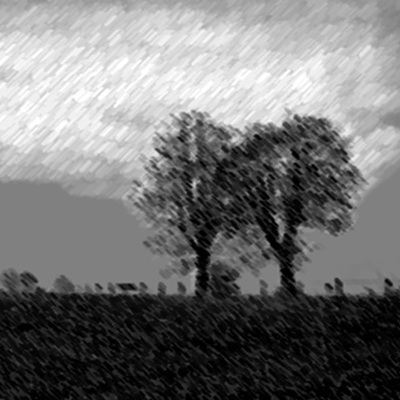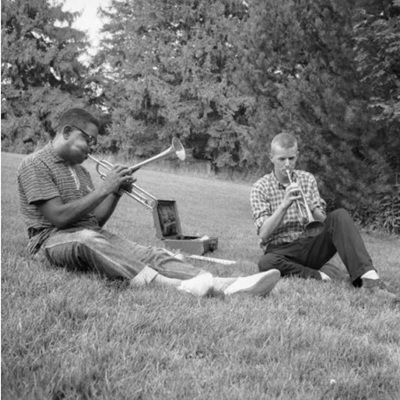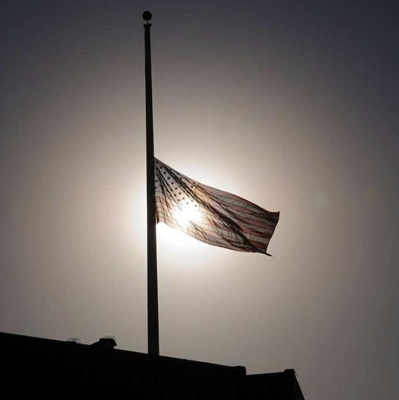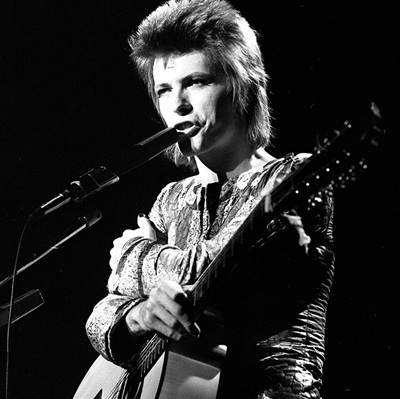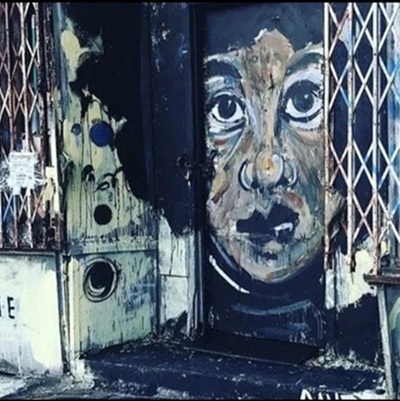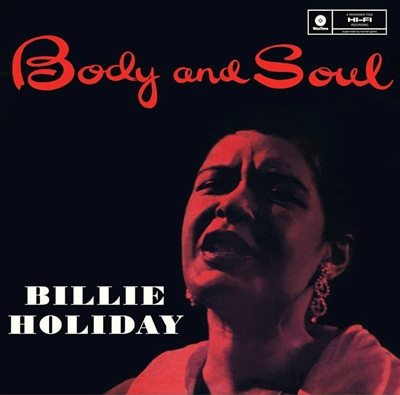.
.
“D-Natural Blues,” a story by Salvatore Difalco, was a finalist in our recently concluded 50th Short Fiction Contest. It is published with the permission of the author.
.
.
.
D-Natural Blues
by
Salvatore Difalco
.
___
.
Galinsky was killing my buzz. I could not see his face behind a fuming joint, clenched between his tarry teeth, but I could see his hands—one holding a deck of playing cards, one opened gesturally. They wove with the languid rhythm of a Greek rhetorician as Galinsky droned on about the pratfalls of legalized cannabis: how the government had screwed up a good thing, how the government was greedy, how the government had put the kibosh on a thriving subculture—a tribe to which we after all, at this game, belonged. The black market had provided a beautiful service, in his words, without all the red tape and documentation blah blah blah. I could barely see the other boys behind a gray-blue indica haze, each squinting into their own throbbing hum, probing their own low-level well of despair. The moody jazz muttering over the speakers—muted Miles—spoke for them.
…..“Deal the cards, Galinsky!” I beseeched.
…..Max, the resident Buddhist, fond of sherpa-wear, sandals and patchouli-scented antiperspirant, presented his wide, smooth face. “Are we ever going to play a hand?” he bellowed.
…..Johnny Fields, violently coughing, emerged as from a toxic cloud with his white goatee bristling and his milky blue eyes bugged out. He suffered from a respiratory illness, and thus should not have been in the smoke-stained, faux-wood-paneled environs of the Applewood Club, under any circumstances. Then again, a degenerate gambler will go to extraordinary lengths to accommodate and nurture his vice. Johnny tried wearing a mask for a time, starting with a cheap industrial model, then moving on to a menacing North 5400 Full-Face respirator, with an anti-scratch polycarbonate lens. But unable to endure the withering attacks of the others, he gave up on the masks, and resigned himself to a shortened life.
…..“Deal the cards, Galinsky!”
…..“He’s frozen.”
…..“Galinsky!”
…..“Sorry, sorry, guys. Lost my train of thought there for a sec.”
…..He sheepishly picked up the deal, sliding cards to himself and the five other players at the table. Carmine had fallen asleep minutes before, after succumbing to a bowl of shatter, his massive head heaped like a prairie bison’s on the grass green felt—but when his turn came up his anemic sidekick, Little Man Cass, nudged his neck.
…..“What the hell!” a startled Carmine loudly slobbered, his lips a red atoll in the ocean of his black beard, his teeth tanned faces of tiny screaming men.
…..I started laughing uncontrollably, though nothing, not even Carmine, really struck me as funny. It belonged more to a branch of hysteria, my laughter. Indeed, my thoughts staggered like drunkards negotiating stadium steps during a dull baseball game. Weaving from one stanchion to another, they stumble and fall, cracking teeth, occipital bones and ocular cavities, much to the low-grade delight of the zombified fans. I dared not scream in front of the men, but in the confines of my skull, how could I not?
…..“Someone change the music,” Johnny said.
…..“The music is fine,” I said. “It’s perfect.”
…..“It’s jazz, man. Who the fuck listens to jazz?”
…..I stood up and slapped my hands down on the felt with ill intent.
…..“Take it easy, Sammy,” Carmine urged, pointing a thick finger of reproach. He then turned to Johnny. “And you, you know he’s fucking sensitive. Why poke the bear?”
…..“Bear?” Johnny said. “What bear? I don’t see no bear. He’s a jazz guitarist. Big fucking whip. So he deserves extra respect? It’s like being a haiku poet, you know. Or an origami master. Kinda useless. Like, who gives a fuck?”
…..Before he could go on with his vile assessment, and before I could leap across the table and rip out his throat, a tiny djinn of karma tickled his throat and he burst into another phlegmy coughing fit that forced him to rise from the table and perform a horrible choke-dance, bending at the waist and shaking his head from side to side like a dog to dislodge the obstructing gob.
…..“Luckily,” said Little Man Cass, bringing his pale head to rest on the green felt and shutting his eyes, “you won’t have to kill him.”
…..“Yes,” Carmine said, “nature takes its course with the Johnny Fields of the world.”
…..This drew collective guffaws from the boys and momentarily relaxed my teeming, antlike anxieties. They had become a commonplace for me, exacerbated mightily by cannabis. People who say cannabis relaxes them have never experienced the frenzies of paranoid kush psychosis. This is a thing, believe me. I glanced at my hands: shaking. Relax, I told myself. relax. But the ants were having none of it.
…..After a minute or so of hacking and spewing, a red-eyed Johnny wiped his mouth with a large, sheet-like handkerchief, stuffed it back into his pocket, and returned to his seat, wheezing like an organetto. Galinsky had not yet dealt the cards. He stood there silent, statuesque, unblinking, perhaps moored on the rocks of some abstract thought.
…..I was reaching my limits. The game had all but broken down, everyone too stoned to play poker with any coherence. This had become all too common, this turbidity, this moronic muddle. New strains of cannabis flower and distillates overwhelmed even hardened chronics, myself included. We used to play a more serious game, crisp, tight, clean, the banter reserved, the stonage more moderate. No one complained about the jazz music back then. Our gatherings had since become a sort of recreation time for mental patients, no offense to diagnosed sufferers. But we would have transitioned smoothly to their game, had they played one and invited us, I am convinced. And Johnny’s slur about my vocation—I dare say profession as I could never make a living at it—cut deep. I had wasted most of my adult life pursuing a chimera, and now, at the age of fifty, was resigned to it being just that.
…..“Do you still play?” Max asked, perhaps innocently enough.
…..“Of course I still play!” I shouted. “Playing is my life!”
…..“Who’s your favourite guitarist?”
…..“Wes Montgomery,” I said without hesitation. I both worshipped and envied him.
…..“African-American?”
…..“Of course,” I said. “Of course.”
…..“Does jazz come naturally to Italians?’ he asked, with a gravity that disarmed me.
…..“What the fuck are you talking about, Max? What does Italian have to do with anything? It’s jazz, it’s music. And besides, I was born in this fucking country.”
…..“I’m just saying, jazz is an African-American art form. Opera, on the other hand, is totally Italian, no?”
…..“He has a point,” Galinsky said. “I saw Pagliacci a few years back at the Royal Alex, great stuff, great stuff. The weeping clown and so forth.”
…..Before I could respond, Johnny again pulled out his ludicrous handkerchief, flapped it open, and blew his nose with a piercing double high C that made me wince.
…..“Italians didn’t invent pasta,” Galinsky added.
…..“It was the Chinese,” Max said.
…..“That’s right,” Galinsky said. “Marco Polo brought it back to Italy from China.”
…..“Haven’t heard that name since like high school,” Max chuckled. “Marco Polo, haha. What a name. Those Italians got around, huh?”
…..Fear of committing violence kept me from responding to these slurs, as no words I could summon, no matter how pointed and hard, could have penetrated the dense fog that engulfed these idiots. I would not have been at the Applewood Club on a Tuesday evening playing stoned poker had I a family. I would have been at home humouring and edifying the little ones, watching a pleasant television program, or massaging the wife’s feet. Same was likely true of the others, inhabiting that time and space with mixed motives, none meritorious. Except for Carmine, none of these men were married, and if they had children, they never mentioned them. Indeed, no one except Carmine—who could not even under threat of death stop yapping about his mail order bride Keiko, Keiko this, Keiko that—ever discussed their home lives as such. Occasionally, a parent or someone familial died and everyone acknowledged the announcement with a semi-respectful nod, then moved on.
…..Perhaps I had grown weary of these silly men, their vices, their games. But what would have become of me had I walked away? Playing guitar in shabby little clubs with my half-baked trio to a few comatose stragglers appealed to me as much as a knife in the liver. That was a life I had left behind, a non-life. After a decade of Applewood, my very atoms were scattered among the bridge chairs and the paneling, and irretrievably mingled with those of these men, whom I despised as much as I sought out every week, and who formed a category distinct from my other friends, indeed from the rest of humanity at large.
…..“Deal the cards!”
…..“The fuck is the matter with you, Galinsky!”
…..“Deal the fucking cards!”
…..I could barely hear the music now—faintly, something screechy from Coltrane—as my ears rang and a leaden sheath of a migraine enveloped and compressed my head, in effect elongating it like one of those Paracas skulls unearthed in Peru.
….. Galinsky finally dealt the cards, laughing with a wet mouth and lidded eyes at some personal consideration. He reputedly held a PhD in Classics, or some such thing, a learned but garrulous man. Who knew what went on in that cucuzza of his.
…..I slapped my forehead, as if this might have chased away Mr. Migraine, but he had parked himself in my right temple, removed his sharp black boots, and tapped my inner skull with a tiny hammer. My right eye shut of its own accord. The music of pain had begun in earnest. Nevertheless I peeked at my cards and when I saw two black aces my heart fluttered. Mr. Migraine tapped harder, faster.
…..Holding up three cards, Carmine declared a misdeal.
…..“Are you kidding me?” I said.
…..“This is the reality,” he said.
….. Galinsky shrugged. “It happens,” he said. “These cards are sticky.”
…..I turned over my hand and the fellas chuckled.
…..“You might consider washing them,” Max said.
…..“Why don’t you fucking wash them?” Galinsky cried, offended by the suggestion.
…..“No need to bite by head off.”
…..“He doesn’t wash himself, why would he wash the cards,” piped in Little Man Cass, who looked like he needed an immediate plasma transfusion.
…..I seethed momentarily. As usual, the poker Gods and Lady Luck were fucking with me. Fate was fucking me over. Lucky men and women live among us. Variance blesses their path. They walk lightly. They are golden. Light shines from their souls. Then there are folks who form the great majority, neither lucky nor unlucky. Variance plays a small role in their lives. They walk on gray feet over gray paths through gray zones, unmolested for the most part, achieving neither bracing highs nor crushing lows. Then there are those sorry bastards that Fate likes to set alight with gasoline or sodomize on a regular basis, for sport: the unlucky ones. It was against the defiled walls of that bottom category where I found myself, unable to gain purchase, clawing vainly for egress.
…..“With whom do you have the greatest conflict here?” Max asked me apropos of nothing.
…..I stared at his smooth face trying to surmise if any swellings of mockery blemished it, but the seamless, unguent quality of his skin, particularly around the eyes, evidenced the earnestness of his inquisition. I scanned the table with little hope of deciphering another face behind the smoke, to discern subtleties of expression and whatnot. Carmine, a blunt man, as if to further stymie me, lit up a reserved torpedo and within a few billowing seconds completely obscured his side of the table.
…..“Little Man Cass,” I said, clutching my right temple, “please switch on the fan.”
…..“It’ll blow the cards around,” he replied quick, his head still resting on the felt.
…..“I can’t see you guys,” I said.
…..“I don’t want to see you guys,” Galinsky quipped, his nostrils opening and closing like wet valves as he dealt the cards again.
…..“I would say Johnny annoys me most,” I said to Max.
…..He nodded. “Look at your cards, Sammy,” he said, trying to hasten the game along.
…..I took a peak: pocket aces again. Damn. What were the odds? Had to wonder how I’d get poleaxed this time. “As I was saying,” I continued, “Johnny annoys me the most. But except for the violence to the eyes—I mean, look at him—he’s as harmless as a big rabbit. By the way, I raise.”
…..Carmine called my raise with malign emphasis. Little Man Cass lifted his head and also called. Max folded and Johnny stared at his cards for a full minute before tossing them into the muck.
…..“But who really stands in the way of my psychological equilibrium,” I said, “is none other than Galinsky.”
….. Galinsky started. “Sammy,” he said, “I had no idea you have a hate on for me.”
…..“Hate is a strong word, man. I wouldn’t go so far as that. Part of me enjoys your company. But sometimes when you talk I feel the little wheels inside my head spinning off their bearings.”
…..“That doesn’t sound kosher.”
…..“Right now I have a headache hammering me like you wouldn’t believe.”
…..“And you’re suggesting I triggered it?”
…..“You may well have.”
…..“Hey boys,” Galinsky declared, “Sammy has a headache. Anyone got an aspirin?”
…..“Do people still take aspirin for headaches?” Max asked.
…..“Aspirin don’t do shit,” said Little Man Cass. He took out a small white cylinder, uncapped it, and shook out two blue pills. “Take these,” he said. “They’ll kill any pain.”
…..“But this is a migraine,” I said.
…..“Believe me,” he said. “I know from migraines.”
…..“Better not be fentanyl.”
…..“Fentanyl? Come on. Why would you say that? It’s phenobarbital, old school.”
…..“Thought it was only for epilepsy or something like that.”
…..“Epilepsy shmepilespy. It’ll make you feel nice.”
…..“Okay Dr. Cass.” I swallowed the two pills with a drink of rye whisky. They stuck in my throat and it took two or three more gulps of whisky to get them down. My thorax burned. I punched my sternum.
…..“You okay?” Little Man Cass asked me.
…..I could feel the lesser and greater wings of my right sphenoid bone delicately cracking as Mr. Migraine tapped away. “Thanks for your concern,” I said, biting back the blinding pain.
…..“Don’t worry,” he said, “in moments you’ll feel mighty fine.”
….. Galinsky dealt out the flop, which featured two threes and a jack. Carmine bet right out. Little Man Cass folded, and without hesitation I shoved all my chips toward the middle of the table, convinced Carmine had no three in his hand. To my surprise and horror, he snap-called my all-in and opened not a three, but pocket jacks. The turn and river altered nothing and my beautiful black aces fell to his full boat like pierced rubber dinghies. Not only had he stacked me, but Mr. Migraine, perhaps in reaction, flew into a rage, splintering my right temporal bone.
…..“And Marconi didn’t invent the radio,” Galinsky said.
…..I wasn’t going to argue. I wasn’t going to lose my cool. A jazzman has to keep his cool, even when he’s in a bad place.
…..“You’re looking unwell,” Max said, touching my elbow.
…..“I should have stayed home tonight.”
…..“Maybe we all should have stayed home,” he said.
….. Wes Montgomery came over the speakers, lithe, rhythmic, effortless. I buried my face in my trembling hands, praying for the phenobarbital to quickly take.
.
;
_____
.
.
.
Salvatore Difalco is the author of 5 books. His new collection MINOTAUR And Other Stories (Truth Serum Press) is due out this autumn. Sal splits time between Toronto, Canada and Sicily.
.
*
.
.
Details about our 51st Short Fiction Contest
.
.
.






